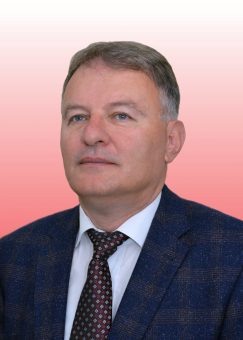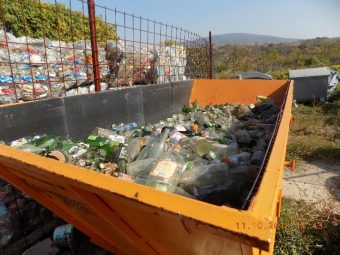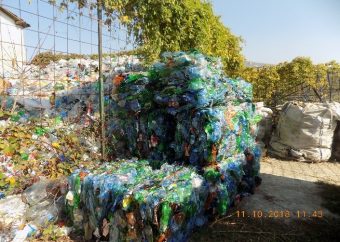
Clean streets and well-arranged public spaces, empty garbage cans, recycling dumpster set up, special containers for medical waste … Benches at parks invite visitors to have a break and enjoy in carefully designed greenery—the same story in the surrounding villages: neat and beautiful environment. There is no sign of unsanitary landfills that pop up throughout Serbia overnight, quicker than any other culture, whatever way you happen to sow it. Instead, everything reminds of some charming borough in Europe, far away from Serbia.
However, this lovely place is situated in the region of Niš. We talk about the municipality of Ražanj whose residents work every day on this crucial task. They are determined to make their borough better so that it becomes a green, ecological municipality. They take care of all green spaces in an efficient way, particularly parks and neighboring woods. We talked with Dobrica Stojković , the President of this municipality, about ideas and plans on turning their municipality into the cleanest community and the most recognizable precisely for it.
EP: How do you plan to become the first ecological municipality in Serbia?
Dobrica Stojković: For a start, we spontaneously organized activities to get Ražanj and all villages neat and tidy. Initially, we defined the methodology for landscaping of public areas by placing the required number of dumpsters, selecting environmental attendants, and organizing the work of communal police in two shifts. We haven’t awarded the determination of ecological municipality to ourselves. It is the way others see us when they come for a visit, probably having compared the situation in our community with the circumstances in other municipalities.
In focus:
We have done everything we possibly could with our staff and available resources. We have developed the Strategy for waste management. There, we specified the exact level of development and set the goals for the future. Unfortunately, we lack funds for equipping the Recycling center, waste collection vehicles sufficient for the whole municipality area and the landfill organization. Our target is to dispose only of 15 percent of solid waste to the landfill by intensive recycling and recyclates production.
When it comes to wastewater treatment, the project has been developed, and we expect it to be implemented this year. The funds are provided through the project financed by The Ministry for environmental protection.

EP: How did you solve the problem of illegal waste dumps?
Dobrica Stojković: We are genuinely trying to prevent illegal waste disposal. Still, if dumps as such emerge, we remove them as soon as possible. The communal police are in charge of monitoring on the spot. We frequently get support from ecological patrols organized by the Green oasis association. Also, all settlements have an outlined area for temporary garbage disposal. This way, waste is collected at one place, and it doesn’t get dissipated around the environment. Along the regional and main municipal roads, we have put trash cans emptied on fixed intervals. Thanks to this system, you will have a hard time finding any garbage along our streets.
EP: Due to the coronavirus epidemic, the whole world has faced using masks and gloves disposal. You have solved that issue relatively efficiently.
Dobrica Stojković: We have dealt with used masks and gloves as dangerous waste, and we provided special containers for their disposal. We empty the containers in cooperation with the local medical center, which is obligated to handle hazardous medical waste. After placing the containers, it was apparent that precisely there ended up the majority of used masks and gloves.
EP: What would you single out as the vital activity in arranging and cleaning streets, parks, and other public areas?

Dobrica Stojković: To provide immaculately clean public spaces, you need to hold all available offices at the municipality responsible, as well as to come to a particular agreement with the public utility company. Therefore, during a meeting with the communal police, the public utility company management, and the Center for Social work heads, we outlined each entity’s precise obligations. As a result, we organized the work of the communal police in two shifts, the intervals for public space cleaning and container emptying were determined. It was agreed that the social assistance beneficiaries would be engaged in cleaning all public spaces in the whole municipality, with appropriate compensation allowed. We have intensified the communal police controls at the whole municipality territory.
We have authorized the communal police to penalize offenders who haven’t taken appropriate measures after the warning. On account of the engagement of all staff, there has been a change in the way the municipality looks in a short time. We have given special attention to the public spaces at the heart of the municipality. The streets and parks have been landscaped. We decided to cover benches at the parks in case of precipitation. Therefore the benches are completely well-kept.
Prepared by: Milica Radičević
Read the story in the new issue of the Energy portal Magazine WATER RESOURCES.

